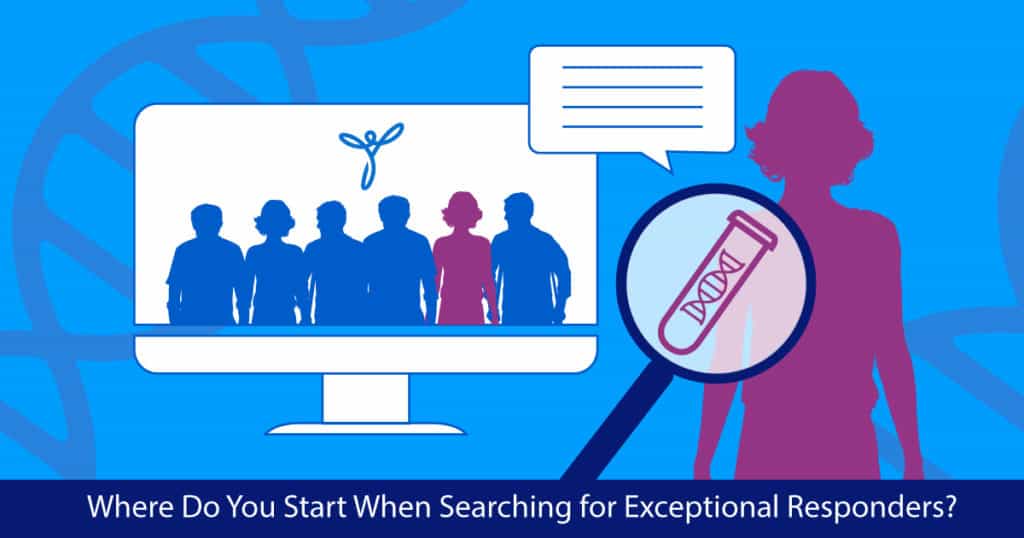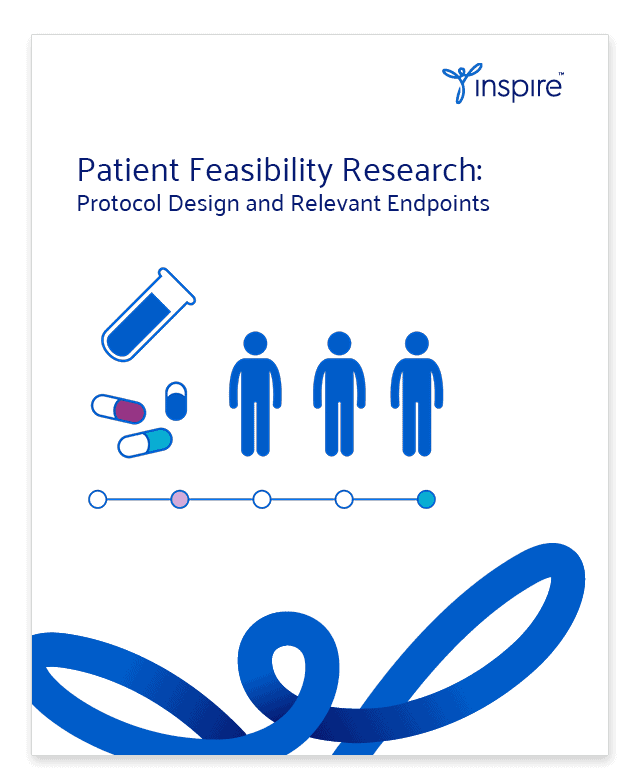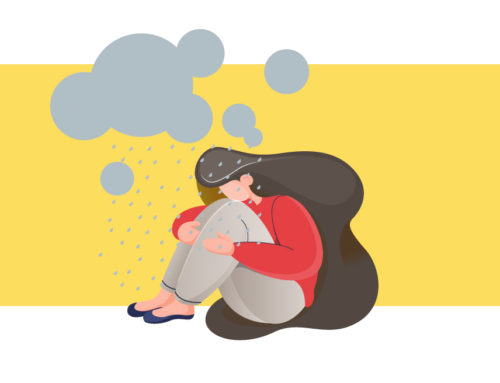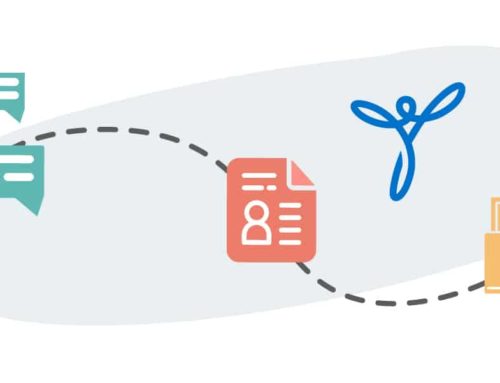Where Do You Start When Searching for Exceptional Responders?

Before 2012, if a cancer clinical trial had only one successful remission amid a field of failures, the drug under trial was thought to be unsuccessful. We weren’t asking a key question: What made it work for that one participant?
The one remission was an exceptional responder. Exceptional responders are in every clinical trial, but until whole genome sequencing (WGS) became available, it was impossible to scrutinize them. In 2012, researchers at Memorial Sloan Kettering used WGS to learn what caused the remarkable and durable remission in one metastatic bladder cancer patient.
The genome sequencing revealed that the patient’s bladder cancer had the specific mutation that the clinical trial treatment specifically targeted – TSC1 (tuberous sclerosis complex 1). Because of that exceptional responder, genetic testing is being used to match patients to targeted anti-cancer treatments.1
Other researchers began to look for genetic variants that are protective of disease. They hypothesized that by looking at huge groups of healthy people’s genomes, they could find individuals with genetic variations that should make them sick but didn’t. In 2016, two years after it started, Mount Sinai Hospital’s Resilience Project identified 13 healthy adults who had the genetic variants for eight genetic diseases that cause severe symptoms in childhood.2 Now, researchers can study what kept these adults healthy.
Recent research is investigating genetic variants that are protective for Alzheimers3 and other challenging conditions.
Finding genetic variants
Research conducted by Stanford University Medical School and Inspire in 2018 catalyzed discussions of how our vast database of patient conversations over 15 years could provide researchers with essential clues to rare events. In this research, Natural Language Processing (NLP) identified unknown adverse drug reactions (ADRs) for chemotherapeutic agents.4,5
This research revealed that Inspire’s population of over two million members, many of whom are open to clinical research opportunities, might have other undiscovered and rare information that could be vital to breakthroughs in treatment.
We presented the idea to a major pharmaceutical company, and it evolved into a clinical study now listed here on clinicaltrial.gov. Dr. Stefan McDonough, who was the Executive Director of Genetics as Pfizer at the time, proposed a search for protective genetic variants for lung cancer.6,7 This required finding patients who met very specific criteria: They had to have been diagnosed with lung cancer in the past but now show no evidence of disease; they had to have a historical diagnosis of two different autoimmune diseases, atopic dermatitis or early onset eczema; and had to have family members with a similar history or who had risk factors (like smoking) but never got lung cancer.
Normally, it could take at least a year for a research endeavor with such strict eligibility criteria to find a few patients. The study team members concluded that if Inspire could find three people and their families within a year, the search would be considered a success.
Using Inspire’s machine learning technology and relying on the goodwill of our members to contribute to life-changing discoveries, we surprised everyone. In just a few weeks we found over a thousand willing members with family members that matched the specific screening criteria, and quickly screened for the top 100 people to enroll.
The project, now called Patient Forward Access to Clinical and Technological Research (PFACTR), has evolved. It is now a partnership among Pfizer, Inspire, the Manton Center for Orphan Disease Research at Boston Children’s Hospital (BCH), and Citizen Genetics. The enrollment process is being led by Alan Beggs, Ph.D., with his team at the Manton Center for Orphan Disease Research at BCH, following the Manton consent protocol, which is an IRB-approved global digital consent process. The virtual consent experience and a study team specialized in genetics research and patient engagement, have been pivotal to the success so far in the study (with special thanks to Dr. Jill Madden and Dr. Catherine Brownstein). No one has dropped out after enrollment.
This observational clinical trial is hypothesis-generating. The benefits of PFACTR02 (Clinical Trial NCT04362852) include:
1) the development of new diagnostic tests and more detailed prognostic information for participants and their families and their disease-linked patient communities and 2) a better understanding of the pathophysiology of these conditions, leading to the development of new potential treatments.8
The hope is that this research will lead to an understanding of those genetic variants, helping researchers find new targeted cancer treatments.
HealthJourney
Building on this success, Inspire developed a new project called HealthJourney. HealthJourney empowers members to offer their experiences and data to each other and, optionally, to researchers. Members will anonymously complete validated PRO surveys on Inspire and, if they choose, connect that data to their anonymous clinical records. With the technology Inspire is developing, members will not only be able to compare their data to others with their conditions, but will also be involved in medical research to find genetic variants or exceptional responders.
As we noted in previous posts, one of the keys to successful research and marketing this year lies in being able to find all kinds of patient data in one place. Through meaningful connections and rich engagement, Inspire and our members are open to and excited about accelerating life-changing discoveries.
Inspire offers a trusted and vital community to patients and caregivers. Our goal with this blog, this website and our content is to provide the life science industry access to the true, authentic patient voice. In so doing, we support faithful operationalization of patient-centricity. Take a look at our case studies, eBooks and news outlet coverage.
References:
1Iyer G, Hanrahan AJ, Milowsky MI, et. al. (2012). Genome sequencing identifies a basis for everolimus sensitivity. Science. 338(6104):221. doi: 10.1126/science.1226344. PMID: 22923433; PMCID: PMC3633467.
2The Mount Sinai Hospital / Mount Sinai School of Medicine. (2016, April 11). Analysis of nearly 600,000 genomes for resilience project. ScienceDaily. Retrieved January 6, 2021 from www.sciencedaily.com/releases/2016/04/160411134321.htm
3Curtis, D, Bakaya, K, Sharma, L et.al. (2020). Weighted burden analysis of exome‐sequenced late‐onset Alzheimer’s cases and controls provides further evidence for a role for PSEN1 and suggests involvement of the PI3K/Akt/GSK‐3β and WNT signalling pathways. Ann Hum Genet. 84: 291– 302. https://doi.org/10.1111/ahg.12375
4Ransohoff JD, Nikfarjam A, Jones E, et al. Detecting Chemotherapeutic Skin Adverse Reactions in Social Health Networks Using Deep Learning. JAMA Oncol. 2018;4(4):581–583. doi:10.1001/jamaoncol.2017.5688
5Pharmacovigilance: Detecting Adverse Drug Reactions in Social Media Posts. https://corp.inspire.com/resource/pharmacovigilance-through-social-media/
6Pfizer Turns to Health Social Network to Find Patients With Rare Lung Cancer Genetic Variants, (2020, November). Precision Oncology News. https://www.precisiononcologynews.com/cancer/pfizer-turns-health-social-network-find-patients-rare-lung-cancer-genetic-variants#.X6WBQmhKjDc
7Breakthroughs Staff, (2020, Sept) Empowering people with supergenes to help unlock new treatment pathways. Breakthroughs at the intersection of health and science, Pfizer. https://www.breakthroughs.com/health-tomorrow/empowering-people-super-genes-help-unlock-new-treatment-pathways
8Patient Forward Access to Clinical and Technological Research: Genetic Influences on Lung Cancer and Atopic Dermatitis (PFACTR02) https://clinicaltrials.gov/ct2/show/NCT04362852






